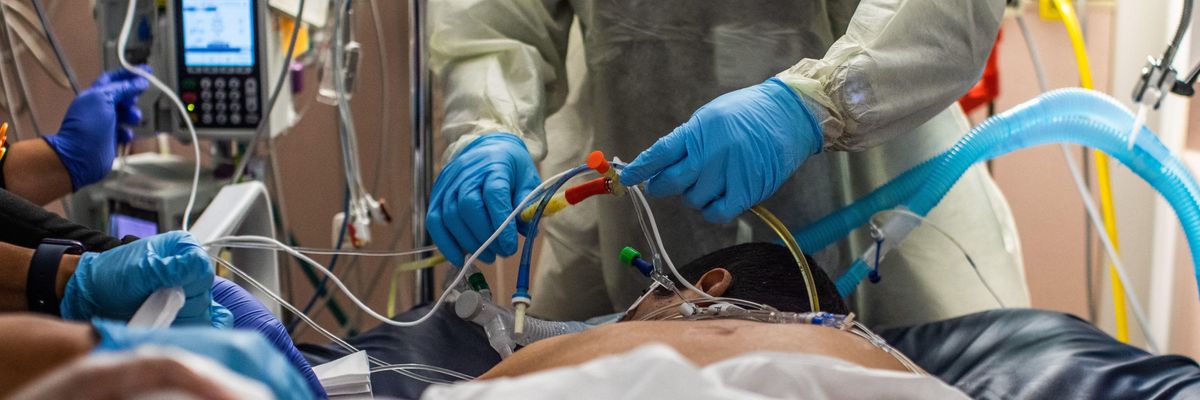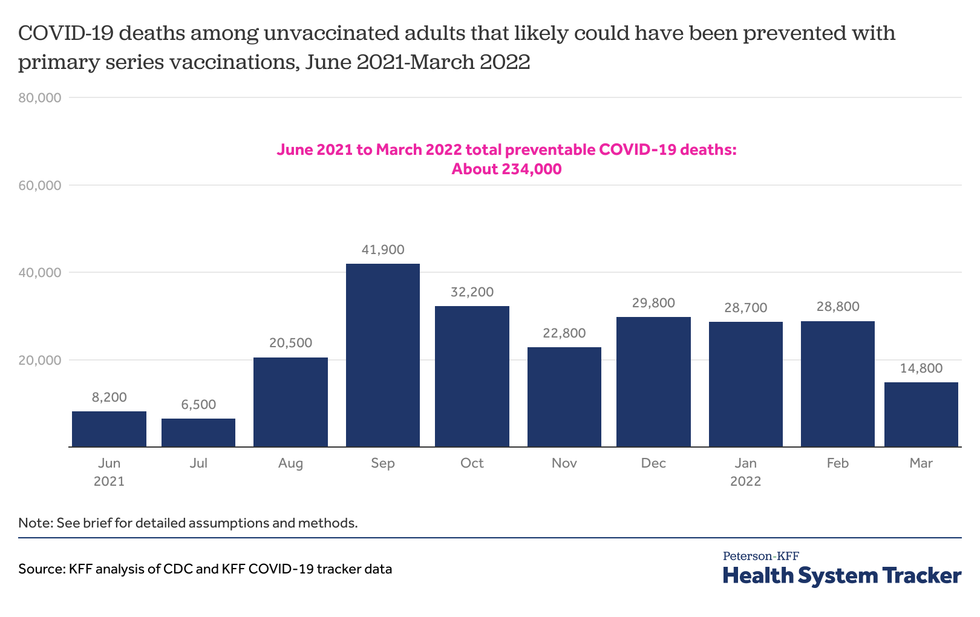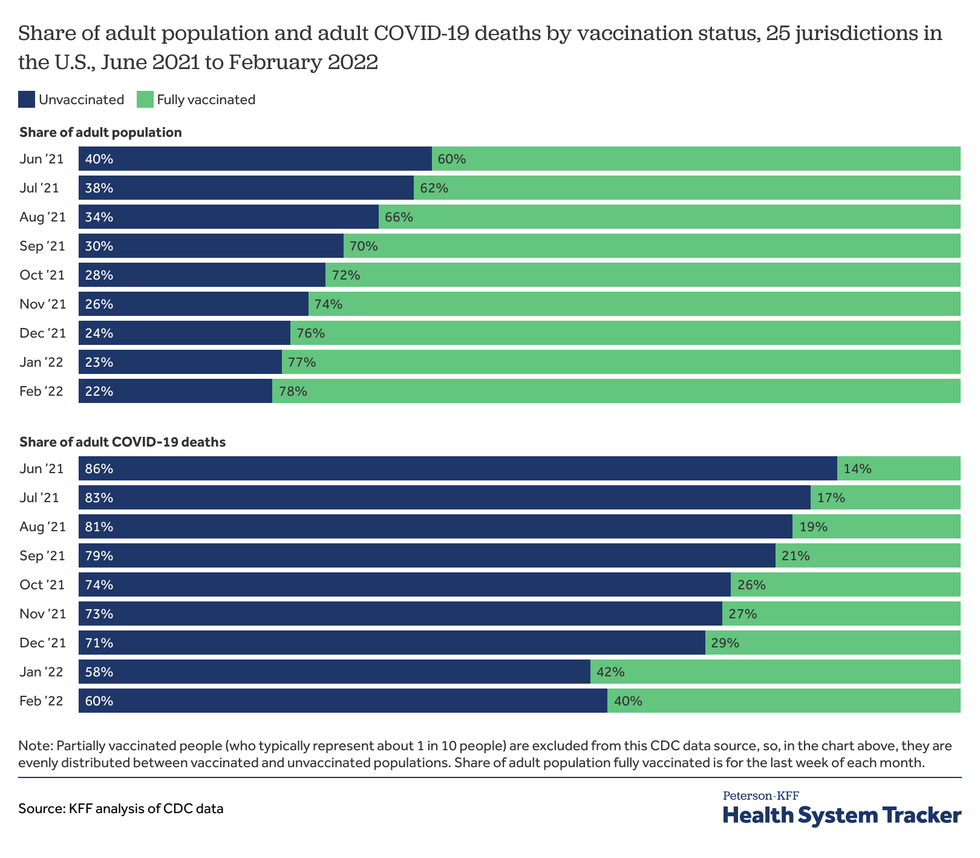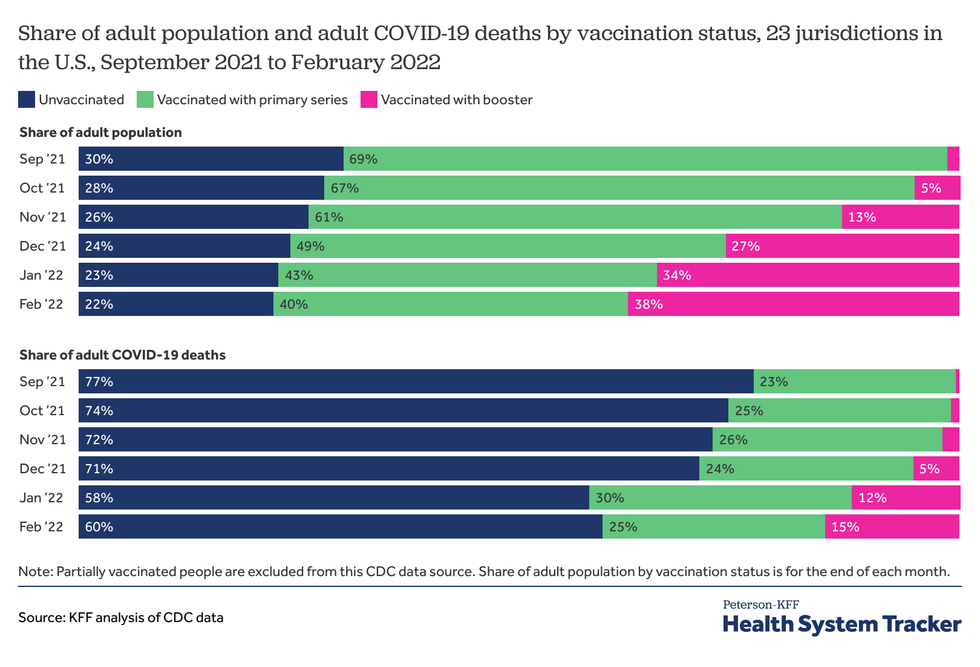Three in five reported Covid-19 deaths in the United States since June 2021 could have been prevented by vaccination, according to a new analysis out Thursday.
With the U.S. approaching one million deaths from Covid-19, the Kaiser Family Foundation (KFF) estimated that approximately 234,000 lives could have been saved with timely primary-series vaccination. These vaccine-preventable deaths represent 60% of all U.S. adult coronavirus mortality since last summer and roughly a quarter of the more than 987,000 Covid-19 deaths that have occurred nationwide since the pandemic began.

Many older and higher-risk adults in the U.S. had access to free, safe, and highly effective Covid-19 vaccines by the start of last year, and doses were made widely available to all adults in the country by early May 2021. It follows that by last June, Americans 18 and older could have been fully inoculated, with a high degree of protection against severe illness, hospitalization, and death.
Instead, 40% remained unvaccinated due in part to inadequate outreach to low-income populations, widespread mistrust of the nation's for-profit healthcare industry, and rampant disinformation promoted by right-wing lawmakers and media outlets.
Although the share of unvaccinated adults in the U.S. has declined over time, an estimated 270,000 unvaccinated adults suffered mostly avoidable Covid-19 deaths from June 2021 to March 2022, according to KFF. A total of 389,000 U.S. adults died from Covid-19 during this time.
Using Centers for Disease Control and Prevention (CDC) data on deaths by vaccination status for 25 jurisdictions, KFF found that the share of Covid-19 fatalities among unvaccinated U.S. adults ranged from a high of 86% in June 2021 to a low of 58% in January 2022.

KFF made clear that not all Covid-19 deaths would have been prevented by vaccines, as the shots "are not 100% effective." Still, applying CDC estimates of vaccine effectiveness against death as they varied over time--from 91% for June through December 2021 to 79% for January through March 2022--researchers concluded that the lives of 234,000 U.S. adults could have been saved.
Notably, KFF's analysis focused on the reduction of coronavirus mortality through first and second doses of the vaccine. Even more deaths--among both unvaccinated and vaccinated people--likely would have been avoided had more people received a booster shot, which the CDC says provides 94% effectiveness against in-hospital death or ventilator support.

Nevertheless, the fact that upwards of 40% of Covid-19 deaths among U.S. adults this January and February occurred among fully vaccinated people has several policy implications.
While administering first doses remains a priority, over a quarter of U.S. adults who died from Covid-19 during the first two months of 2022 were vaccinated but not boosted, and many may have been saved by a third shot, KFF noted.
However, relying only on vaccines while eschewing non-pharmaceutical interventions including improved ventilation, mask mandates, and other public health measures puts many people, especially the elderly and immunocompromised, in harm's way.
In its summary of KFF's findings, the Washington Post asked, "Had the country embraced the utility of the vaccines in a bipartisan manner from the outset, what would our death toll be today?"
Sharing the Post's article, Harvard epidemiologist Justin Feldman pointed out that "the U.S. would still have the highest cumulative Covid death rate among wealthy countries even if it achieved a much higher vaccination rate once vaccines became available."
Recent analyses documenting how people in the U.S. are dying from Covid-19 at significantly higher rates than people in other wealthy countries--with poor counties suffering twice as many deaths as rich ones--have prompted fresh criticisms of the nation's lack of universal healthcare and paid sick leave, among other benefits enjoyed in much of the world.
Public Citizen estimated in a report last year that hundreds of thousands of coronavirus deaths likely would have been prevented if the U.S. had a single-payer, Medicare for All system.
Progressives, as Common Dreams has reported, have argued that the catastrophic handling of the coronavirus crisis in the U.S.--while made worse by former President Donald Trump and his supporters--is better understood as the product of several decades of "free-market" ideology and associated policies. Research has shown that union-busting and austerity--key components of neoliberalization--exacerbate inequalities and vulnerabilities, hindering effective governmental responses to the unfolding disaster.
As he shared KFF's findings on social media, Public Citizen president Robert Weissman issued a reminder that "the loss of life from failing to vaccinate people around the world is far, far greater." The problem of global vaccine apartheid--a result of dose hoarding by rich governments and knowledge hoarding by profit-maximizing pharmaceutical corporations--"is completely solvable," he added, "with sufficient political will."




